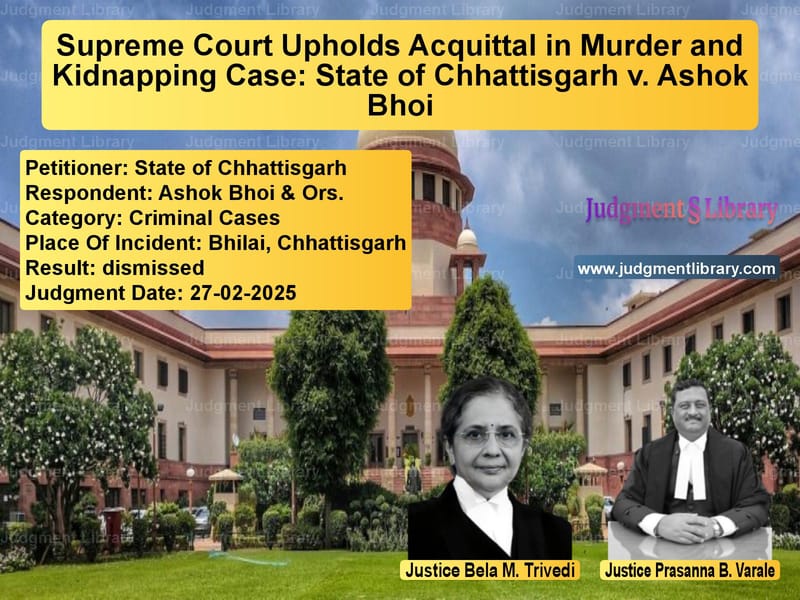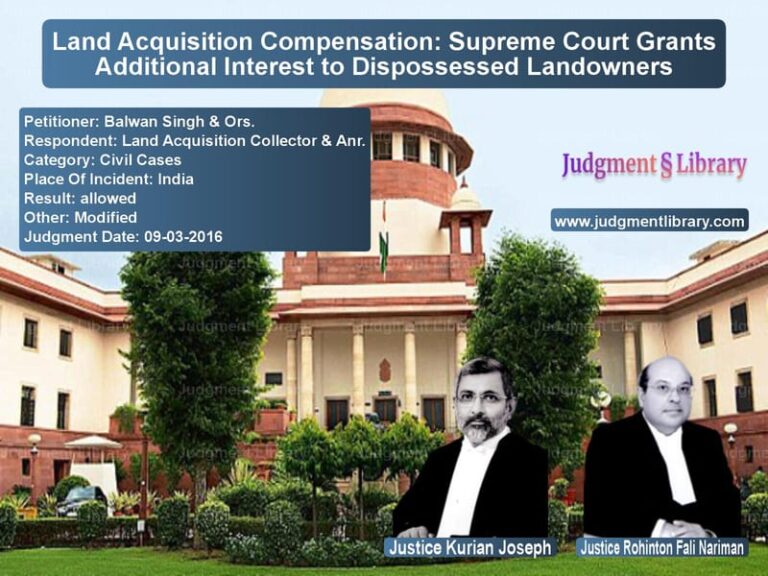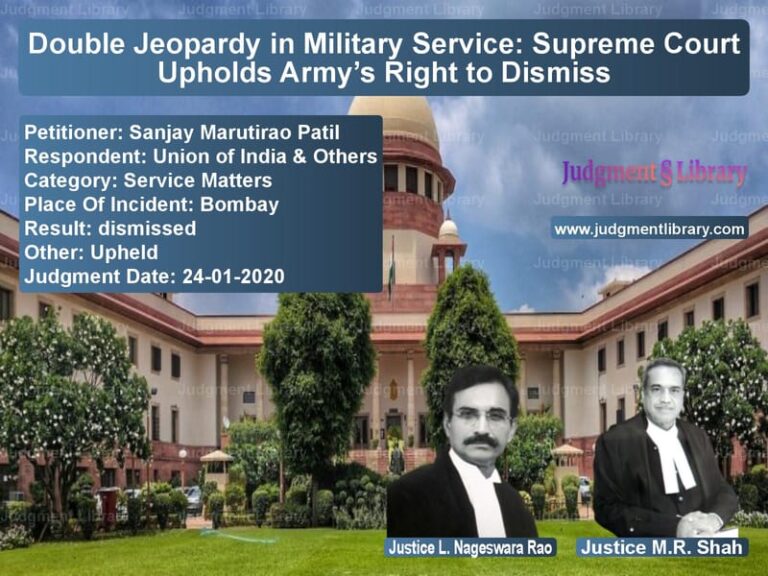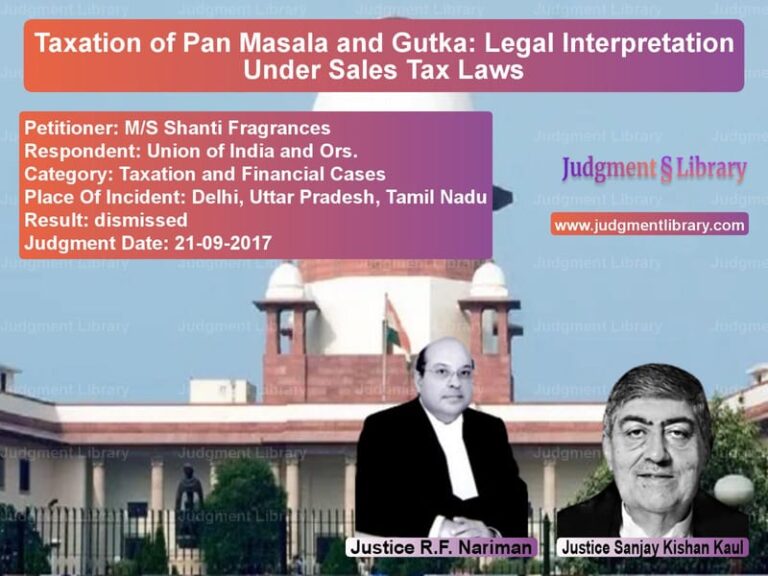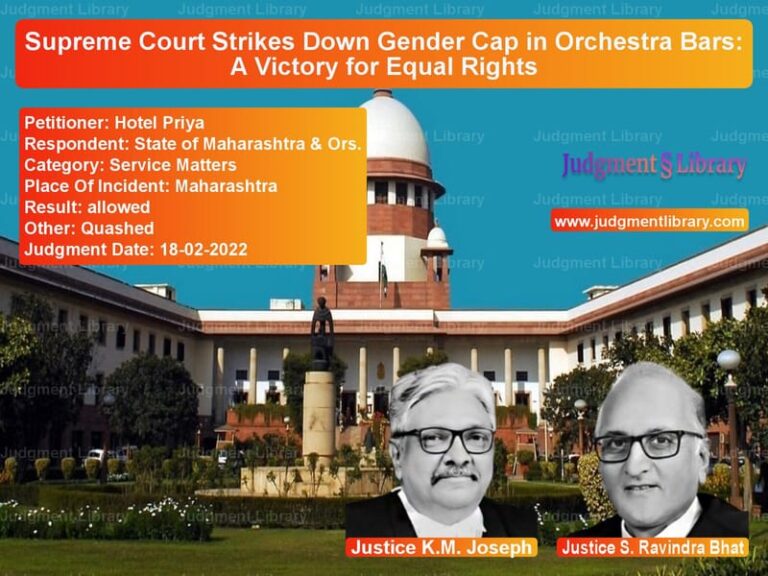Supreme Court Upholds Acquittal in Murder and Kidnapping Case: State of Chhattisgarh v. Ashok Bhoi
The Supreme Court of India recently dismissed the appeals filed by the State of Chhattisgarh against the acquittal of the accused in the case of State of Chhattisgarh v. Ashok Bhoi & Ors.. This case revolved around the kidnapping and murder of a minor, where the prosecution relied primarily on circumstantial evidence. The Supreme Court upheld the High Court’s decision, emphasizing the need for a strong and unbroken chain of evidence in cases based on circumstantial evidence.
Background of the Case
The case pertains to the alleged kidnapping and murder of Suhash, the minor son of complainant Uttamlal (PW-1), in January 2006. According to the prosecution, the accused Ashok Bhoi and Vikash Khubwani conspired to kidnap Suhash for ransom. On the evening of January 15, 2006, Suhash was sent by his father to find his elder brother, Swapnil, who had not returned home. However, Suhash also went missing.
Later that night, Swapnil received a phone call demanding ₹2 lakhs in ransom for Suhash’s release. The complainant lodged an FIR at Police Station Bhilai at around 10:45 PM. The investigation led to the detention of two juvenile offenders, Jivrakhan and Ukesh, who revealed the location of Suhash’s body, which was found in an abandoned house on January 17, 2006.
Based on further investigation, the police arrested the main accused, Ashok Bhoi, and later implicated Vikash Khubwani. The prosecution alleged that the accused had kidnapped Suhash for ransom and later murdered him when the ransom was not paid.
Trial Court’s Findings
The Sessions Court, Durg, convicted Ashok Bhoi under Sections 364A and 302 of the Indian Penal Code (IPC) for kidnapping for ransom and murder. However, the court acquitted Vikash Khubwani due to a lack of direct evidence connecting him to the crime.
High Court’s Acquittal
On appeal, the Chhattisgarh High Court overturned the conviction of Ashok Bhoi, ruling that the prosecution failed to establish a complete chain of circumstantial evidence. The court also upheld the trial court’s acquittal of Vikash Khubwani.
Arguments Before the Supreme Court
Petitioner’s Arguments (State of Chhattisgarh)
The State argued that the High Court erred in its judgment and failed to appreciate the circumstantial evidence correctly. The prosecution’s key points were:
- The deceased was last seen alive with accused Ashok Bhoi on the evening of the incident, as testified by PW-18.
- Ashok Bhoi failed to explain the whereabouts of Suhash after the last-seen evidence.
- Recovery of blood-stained objects, including a blade, nails, and a T-shirt from the accused’s house, corroborated the prosecution’s theory.
- The theory of “last seen together” should have shifted the burden of proof onto the accused under Section 106 of the Indian Evidence Act.
Respondents’ Arguments (Defense Counsel for Ashok Bhoi and Vikash Khubwani)
The defense contended that the High Court’s judgment was legally sound, as the prosecution failed to prove guilt beyond reasonable doubt. Their arguments included:
- The case was entirely based on circumstantial evidence, with no direct proof of involvement.
- The alleged ransom call was not conclusively linked to the accused since the STD-PCO operator from where the call was made was not examined.
- The recovery of blood-stained objects was made two days after the incident, raising doubts about their evidentiary value.
- The principle of “last seen together” cannot be the sole basis for conviction, especially when the time gap between the last-seen evidence and the discovery of the body is significant.
Supreme Court’s Observations
The Supreme Court analyzed the case by applying the principles governing circumstantial evidence.
Key observations by the Court:
- “The prosecution’s case is based purely on circumstantial evidence, which must form a complete chain without any break, leading to the only possible conclusion that the accused committed the crime.”
- “Suspicion, however strong, cannot replace proof beyond reasonable doubt.”
- “Section 106 of the Indian Evidence Act places the burden on the accused to explain circumstances within their exclusive knowledge, but it does not absolve the prosecution of its primary duty to prove guilt.”
- “The ‘last seen together’ theory is insufficient to convict unless supported by other incriminating evidence.”
- “The prosecution failed to provide any reliable evidence linking the accused directly to the murder.”
Final Judgment
The Supreme Court dismissed the appeals filed by the State of Chhattisgarh, upholding the High Court’s acquittal. The key rulings were:
- The conviction of Ashok Bhoi was overturned.
- The acquittal of Vikash Khubwani was confirmed.
- The prosecution failed to establish a complete chain of circumstantial evidence.
- Section 106 of the Evidence Act does not relieve the prosecution of its burden to prove guilt beyond reasonable doubt.
Impact of the Judgment
This ruling has significant implications for criminal law, particularly in cases relying on circumstantial evidence:
- Reaffirms the importance of direct evidence: Courts must exercise caution while convicting based purely on circumstantial evidence.
- Clarifies the application of Section 106 of the Evidence Act: The burden of proof on the accused does not diminish the prosecution’s responsibility to establish guilt.
- Strengthens protection against wrongful convictions: Ensures that mere suspicion does not lead to a miscarriage of justice.
- Sets a precedent for future cases: Reinforces that the “last seen together” theory alone cannot form the basis for conviction.
Conclusion
The Supreme Court’s judgment in State of Chhattisgarh v. Ashok Bhoi & Ors. underscores the critical principles governing criminal trials based on circumstantial evidence. By dismissing the appeals, the Court upheld the fundamental principle that guilt must be proven beyond reasonable doubt. This case serves as an essential precedent for cases where the prosecution relies heavily on circumstantial evidence to secure convictions.
Petitioner Name: State of Chhattisgarh.Respondent Name: Ashok Bhoi & Ors..Judgment By: Justice Bela M. Trivedi, Justice Prasanna B. Varale.Place Of Incident: Bhilai, Chhattisgarh.Judgment Date: 27-02-2025.
Don’t miss out on the full details! Download the complete judgment in PDF format below and gain valuable insights instantly!
Download Judgment: state-of-chhattisgar-vs-ashok-bhoi-&-ors.-supreme-court-of-india-judgment-dated-27-02-2025.pdf
Directly Download Judgment: Directly download this Judgment
See all petitions in Bail and Anticipatory Bail
See all petitions in Murder Cases
See all petitions in Judgment by Bela M. Trivedi
See all petitions in Judgment by Prasanna Bhalachandra Varale
See all petitions in dismissed
See all petitions in supreme court of India judgments February 2025
See all petitions in 2025 judgments
See all posts in Criminal Cases Category
See all allowed petitions in Criminal Cases Category
See all Dismissed petitions in Criminal Cases Category
See all partially allowed petitions in Criminal Cases Category

